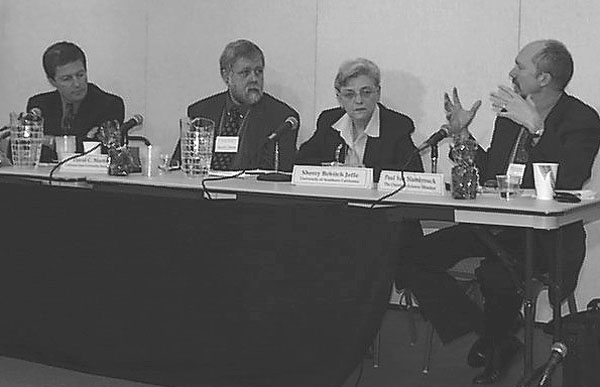California?s top political reporters honored

Image: California?s top political reporters honored:Panelists (from left to right) Kevin Riggs, political reporter for KCRA, David C. Martin, Sac State communication studies professor, Sherry Bebitch-Jeffe, senior associate at Claremont Graduate University?s School of politics and Economics and Paul Van Sl:
March 7, 2001
The Seventh Annual California Journalism Conference and Awards Dinner was held on Thursday, March 1, at the Steven Lee Yamshon Alumni Center. The night honored the state?s best political reporters.
The event was co-hosted by the Center for California Studies at Sacramento State and the Sacramento Press Club. The conference held panel discussions on the “California Shield Law in 2001” and “How the National News Media Views California.”
The first panel debated California?s Shield Law, a special privilege given to the press to protect sources. Speaking on the side of the Shield Law was David Sommers, former editor of The State Hornet, who was involved in a court battle over unpublished notes and photographs.
Another panelist in favor of the Shield Law was Thomas W. Newton, a general counsel and legislative advocate of the California Newspaper Publishers Association.
The opposing panelists were Dorothy Klishevich, Chief Deputy District Attorney for the San Joaquin County District Attorney?s Office, and John Cary Sims, a professor of law at the McGeorge School, University of the Pacific.
Robert Humphrey, professor of communication studies at Sac State, moderated the discussion.
Klishevich was preparing a death penalty case with special circumstances against Anthony Desoto, an inmate who raped and killed his cellmate, when she ran into problems with the Shield Law.
The evidence of the crime was in the inmate?s statements to the guards, but Klishevich felt that Desoto had given conflicting statements during an interview with a reporter from KOVR 13, Sacramento?s CBS affiliate. Klishevich subpoenaed for the unpublished part of the interview, but the reporter refused and invoked his Shield Law privileges.
“The interview was not confidential or secret. The information was never intended to be confidential by the defendant,” Klishevich said.
She felt the broadcast of the interview would be an editorial decision and responsible journalists should consider the circumstances before invoking their Shield Law privileges.”The Shield Law was not designed to be used that way,” Klishevich said.
In response, Newton said there was an interest to be protected and that journalists do not want to be helpers of the government.
“They want to be independent observers,” Newton said. “Reporters should be the last resort, not the first.”
In an open forum, the second panel discussed how the national media views California politics. The panel featured Sherry Bebitch-Jeffe, senior associate at Claremont Graduate University?s School of Politics and Economics, and Paul Van Slambrouck, bureau chief for the Christian Science Monitor.
Another member of the panel was Kevin Riggs, a political reporter for KCRA Channel 3.
The moderator was David Martin, professor of communication studies at Sac State.”People see California politics as personality politics,” Bebitch-Jeffe said.
Bebitch-Jeffe commented on the power crisis that hit California, saying the national media saw it first as a “flaky California” problem but now is realizing that it may be a national crisis.
Regarding the national media?s portrayal of the Rodney King verdict and the Los Angeles riots that occurred, Van Slambrouck said, “Nationally, a lot of people still see the racial problems as black and white unless you live in California.”
The California Journalism Awards recognize outstanding reporting on California public affairs and politics. This year?s print awards were named in honor of the award-winning Sacramento Bee columnist John Jacobs, who died this past year.
The John Jacobs award was given to Daniel Weintraub of the Orange County Register for his series of short narratives about a lobbyist, titled “Freeze Out,” and Jim Sweeney of Copley News Service for “High-Stakes Gamble,” an article on Vegas-style casinos planned for tribal lands.
The Katherine MacDonald award for excellence in student journalism was given to Virginia Seller-Erxleben for her work at The Collegian at CSU Fresno.
The award for overall excellence in radio broadcasting was awarded to Ellen Ciurczak of the California Report for KQED in San Francisco and Aaron Glantz of KPFA in Berkeley.For overall excellence in television broadcasting, awards were given to Randy Paige of KCBS in Los Angeles and Kevin Riggs of KCRA.
The conference ended with the keynote speaker, Andrew Lam, an associate editor with the Pacific News Service and a commentator on News Public Radio?s “All Things Considered.” Lam spoke on the globalization and the complexity of surrounding identity in California.




























































































































